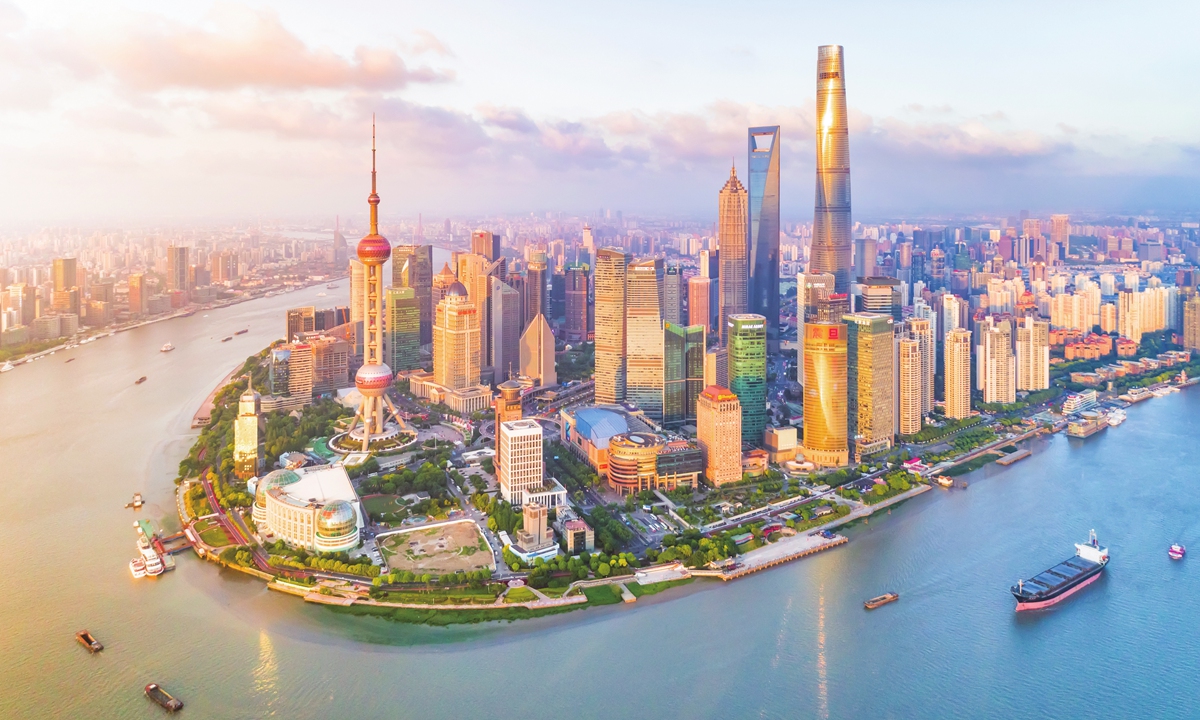China's opening-up a valuable global public good amid US protectionism

A view of Shanghai Photo: VCG
High-quality development and Chinese modernization have been the hotly discussed terms since the 20th National Congress of the Communist Party of China (CPC). The accompanying question is, how to walk toward high-quality development and achieve Chinese modernization?
The 20th National Congress of the CPC in October last year stated that the overall strategic arrangement of Chinese modernization is set into two stage: basically realize socialist modernization from 2020 through 2035; then build China into a great modern socialist country that is prosperous, strong, democratic, culturally advanced, harmonious, and beautiful from 2035 through the middle of this century. High-quality development should be the key to achieving this ambition.
The question is how to achieve high-quality development? The united front, armed struggle and the Party building were the three magic weapons during China's revolution era. Nowadays, Chinese modernization calls for the new three magic weapons, that is, reform, opening-up, and innovation under the leadership of the CPC. Among them, opening-up is the foremost and the prerequisite for reform and innovation. China has been promoting reform by opening itself up for the past decades. The impetus for reform often comes from opening-up, and wider opening-up can drive reform. Likewise, innovation requires opening-up, and there is no innovation in the true sense without opening-up. The development of the US was a result of its opening-up. There are three major open systems in American society, including open education, open business, and open financial system. These three parts are interrelated and mutually reinforcing. In addition, the openness of American society has also formed mutual constraints and supervision among social groups.
The three major US open systems are not just for domestic purposes, but for global purposes. Only by opening up can the market attract the best labor and talent from around the world. In terms of the opening-up policy, the US pursues the principle of "reciprocal opening-up," that is, mutual opening-up. However, it covers the truth that the US only "imports" but not "exports" in many important areas in the US, especially in terms of labor forces. The US was originally a country of immigration. Before and after World War II, the US attracted talent from European countries, putting it ahead of other countries in almost all aspects of science and technology. During the Cold War, the US then absorbed talents from all over the world, including those from Eastern European countries. Today, the US is applying the same strategy in the competition with China. In fact, the competition for talents between the US and China has turned fierce.
Nevertheless, we should note that American society is gradually becoming closed. The US was the main driver of the previous wave of globalization, which brought huge fortune to the US. Unfortunately, the vast minority controls the vast majority of social wealth out of the failure of social distribution and widening income disparity. The highly polarized society has led to the rise of populism. As a result, economic nationalism and trade protectionism have prevailed in the US since the Trump era. Once the society is closed, the development of technology will stagnate.
China has undergone two opening-ups in modern times. The first was a forced one after the Opium Wars in the 19th century. The seemingly powerful Qing Dynasty was defeated by Britain.
The second is the reform and opening-up since 1978. China took the initiative to open its door to bring in advanced international capital, technology and management, and then implemented the "going out" strategy through joining the WTO and proposing the Belt and Road Initiative, seizing the valuable opportunity of globalization since the 1980s, and creating a number of economic miracles.
China is now opening up for the "third time." Different from the second time, China needs new reform, new opening-up, and new innovation. We need to deeply recognize that rules-making has become the core in the competition with the US, and the most effective way for China is the "third opening-up." Apart from traditional issues such as quantity and quality of investment and trade, technology upgrading and innovation, more focus should be put on the issues regarding discourse and rules. Only by achieving institutional opening-up on the basis of market opening-up can China embark on a road of high-quality development.
Individuals, organizations and nations will be eliminated if they fail to keep pace with the times in the process of opening-up. If they lose their own traits, they will be thrown out of the process. In this sense, the definition of Chinese modernization given by the 20th National Congress of the CPC is scientific and in line with reality, that is, Chinese modernization contains elements that are common to the modernization processes of all countries, but it is more characterized by features that are unique to the Chinese context.
Internally, China has become more prosperous because of opening-up. Externally, China has risen to the status of a great power also because of opening-up. At a time when the US, the world's largest economy, is pursuing economic nationalism and trade protectionism, the world urgently needs China to encourage "opening-up", the international public good that the world requires most today.
The author is Professor at the Chinese University of Hong Kong, Shenzhen and President of the Institute for International Affairs, Qianhai. The article was compiled based on his speech at the recent Baichuan Forum 2023 - "2nd China Behavioral and Experimental Economics Forum: How to Achieve Chinese Modernization and High Level of Opening-up." opinion@globaltimes.com.cn





Geen opmerkingen:
Een reactie posten